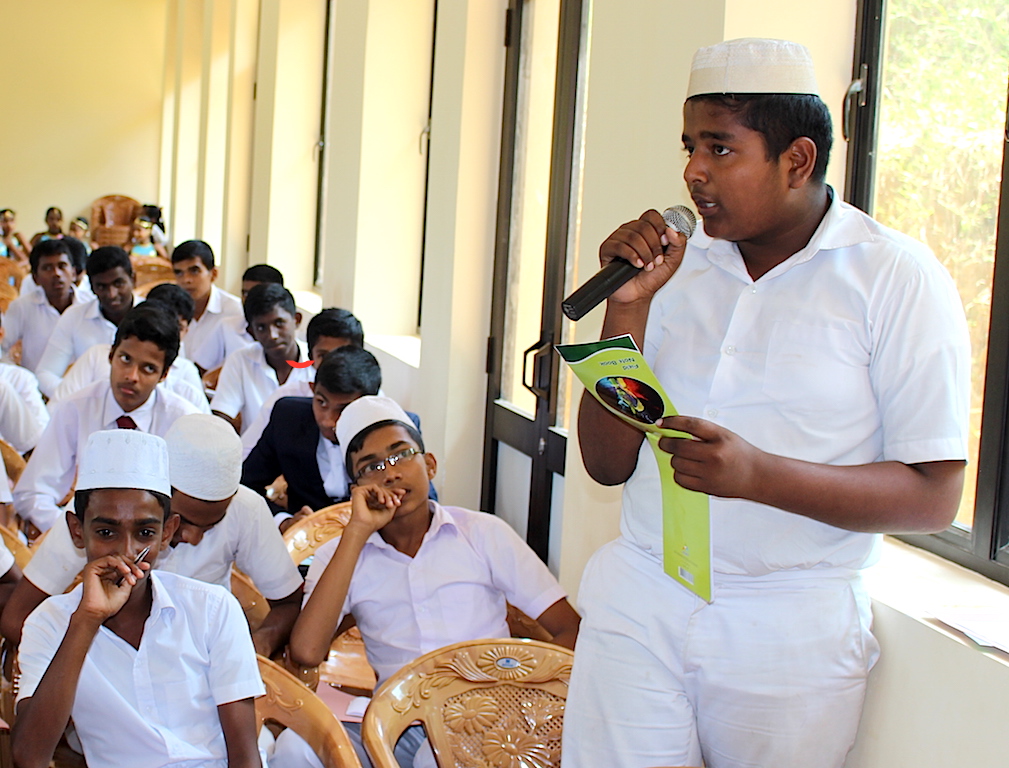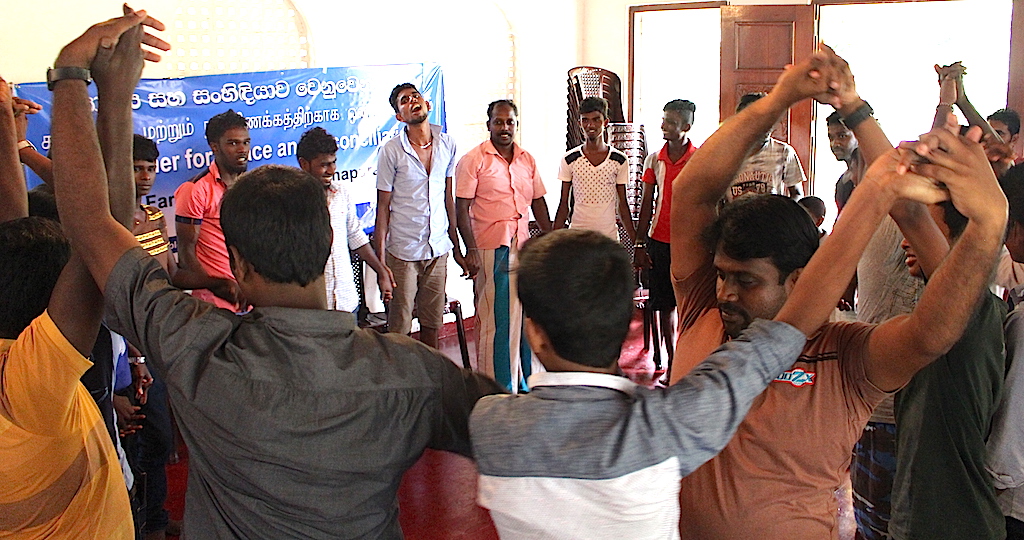NPC staff members met several Buddhist monks in the Polonnaruwa district to get their support for the reorganization of the Polonnaruwa District Inter Religious Committee (DIRC). They first visited the Talpotha temple in the Lankapura Divisional Secretariat division and spoke to the chief incumbent of the temple Ven. Mahadivulweva Pangnarama, Deputy Principal of Sri Perakumbha Maha Pirivena, who is an active DIRC member.
News
NPC’s project, Post Conflict Healing: A Women’s Manifesto, was implemented with the support of FOKUS from April 2014 to December 2016 in nine districts across the country that were both directly and indirectly affected by the war: Vavuniya, Mannar, Trincomalee, Ampara, Galle, Hambantota, Kandy, Nuwara Eliya, and Puttalam.
An orientation meeting was held to introduce the Initiating Multi Level Partnership for Conflict Transformation (IMPACT) project to Puttalam DIRC members and get their support for its implementation.
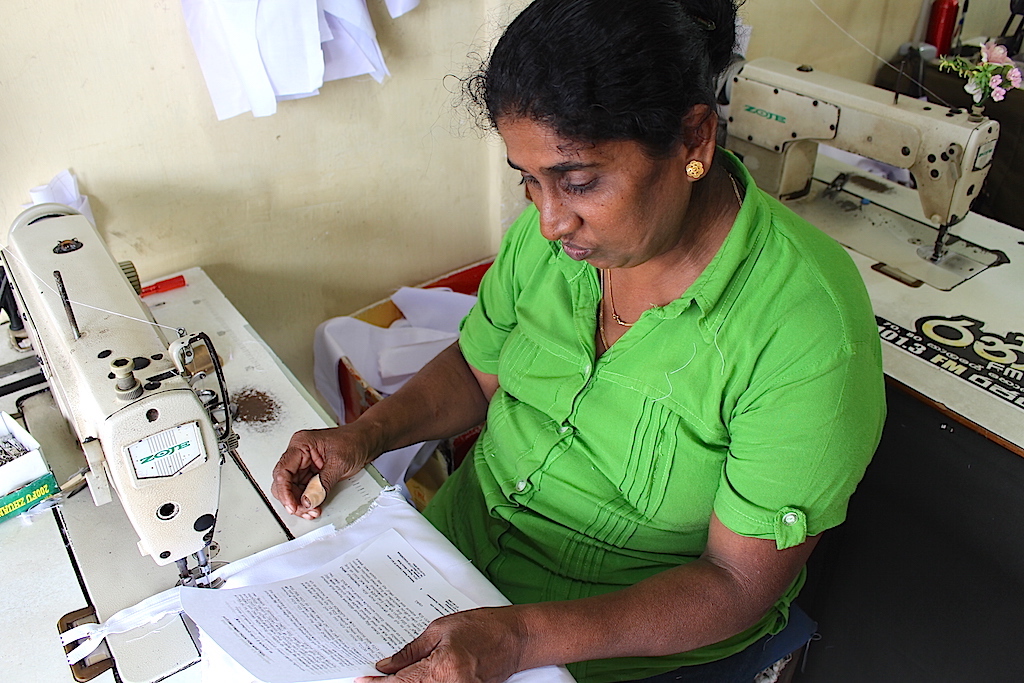
To counter these efforts, the Polonnaruwa District Inter Religious Committee (DIRC) organised a campaign to distribute leaflets and put stickers on vehicles to promote importance of inter religious and inter ethnic harmony by emphasising on equality irrespective of ethnicity, religion, caste, or political party.
DIRC members and youth, together with religious leaders, carried out the campaign in the Kaduruwela and Polonnaruwa town areas. The police, Ceylon Transport Board and other government authorities supported the campaign. Their participation strengthened the civil society organisers of the event.
Many people who read the leaflet and wanted to display the sticker on their vehicles pointed out that this was an important effort to counter extremist movements.
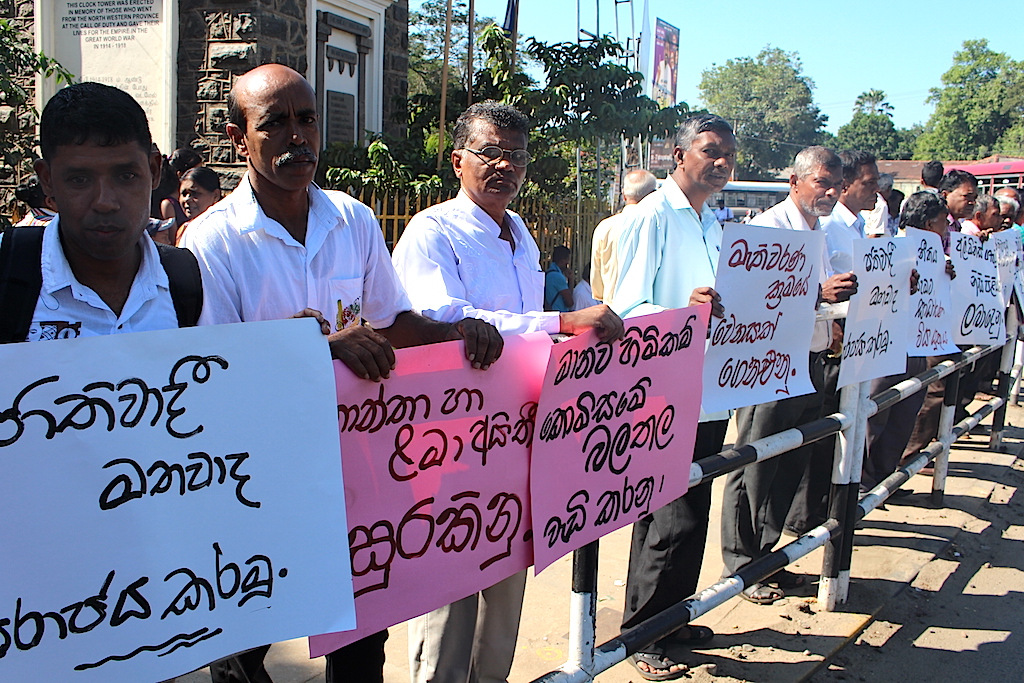
In an effort to counteract such views, Kurunegala DIRC organised a protest and march in Kurunegala town, attended by about 200 civil society activists carrying placards with messages condemning racism and extremism. The protest ended with a seminar about protecting human rights. About 250 people participated. Speakers included Chairperson of Human Rights Commission Deepika Udugama and Executive Director of People's Action for Free and Fair Elections (PAFFREL) Rohana Hettiarachchi who spoke about the importance of protecting human rights and national reconciliation.
As part of its ongoing peace building effort, NPC conducted four Truth Forums in Jaffna, Batticaloa, Kandy and Matara. In each of these districts, inter religious committees that had been set up several years earlier were tasked with identifying those who had been victims in the past and persuading them to share their stories with the larger community. This was to generate empathy for the other within the larger community. It was also to convey the message that civil society itself needs to take on responsibility for assisting the victims, rather than leaving it all to the government. When people share their stories of enforced victimhood and what happened to them and to their loved ones it generates empathy in the listeners who get to know at first hand the sufferings that others have gone through.
Another reason for organising the Truth Forums was to prepare the general population for the anticipated government appointed Truth Commission. In responding to the international demand for accountability of past violations of human rights and war crimes, the government has said it will establish a Truth Commission to be a part of the reconciliation mechanisms. Over 40 countries that have suffered war and mass violations of human rights have appointed Truth Commissions over the past four decades to deal with post-war issues of justice and accountability. The purpose of these mechanisms is not only to placate the international community’s sense of justice and accountability. It is also to involve the people in the process of transformation that accompanies an attitudinal shift from a divided past to a shared future.
What was significant about the Truth Forums was that they were taken seriously by all who participated in them. Between 80 to 100 persons drawn from different walks of life, including public servants, members of community based organizations and media attended the events in each of the places where they were conducted, which were presided over by retired judges or public servants. The time frame of the story telling by victims was not limited to the last phase of the war. It also included the suicide bombing incident that took place in Matara in 2009, the eviction of Muslims from the North in 1990 and the JVP insurrection of 1988. Over and over again those who spoke, either as victims or as observers said this must never happen again. The victims who testified will be expecting some remedial measures to be taken to address their urgent needs.
Apart from saying never again, those who participated in the Truth Forums said that something had to be done to address the needs of the victims. Government servants who attended, though not in their official capacities, pledged that they would do what was in their power to help the victims from within the structures of government. Community leaders said they would see what they could do to follow up on the disclosures made. However, along with these positive indications of the willingness of the community to take on the task of reconciliation, there were also intrusions of harsher realities. The ability of civil society organisations to solve people’s problems cannot be compared to that of the government. In one location, the manager of the conference hall was visited by the security forces. They questioned and intimidated him so much that he said he would no longer provide facilities for such a programme.
The positive outcome of the civil society led Truth Forums points to the promise of the government’s Truth Commission which is about to be established. It also suggests that instead of a single and centralised Truth Commission, a decentralised process of truth seeking could also be envisaged. Alongside the main Truth Commission there could be local level Truth Commissions that are entrusted to local community and religious leaders and which feed into the government-led truth seeking process. The conviction that the violence and human rights violations of the past must never again happen can capture the mass imagination to facilitate constitutional reform that unlocks the door to a lasting political solution to the decades long ethnic conflict.
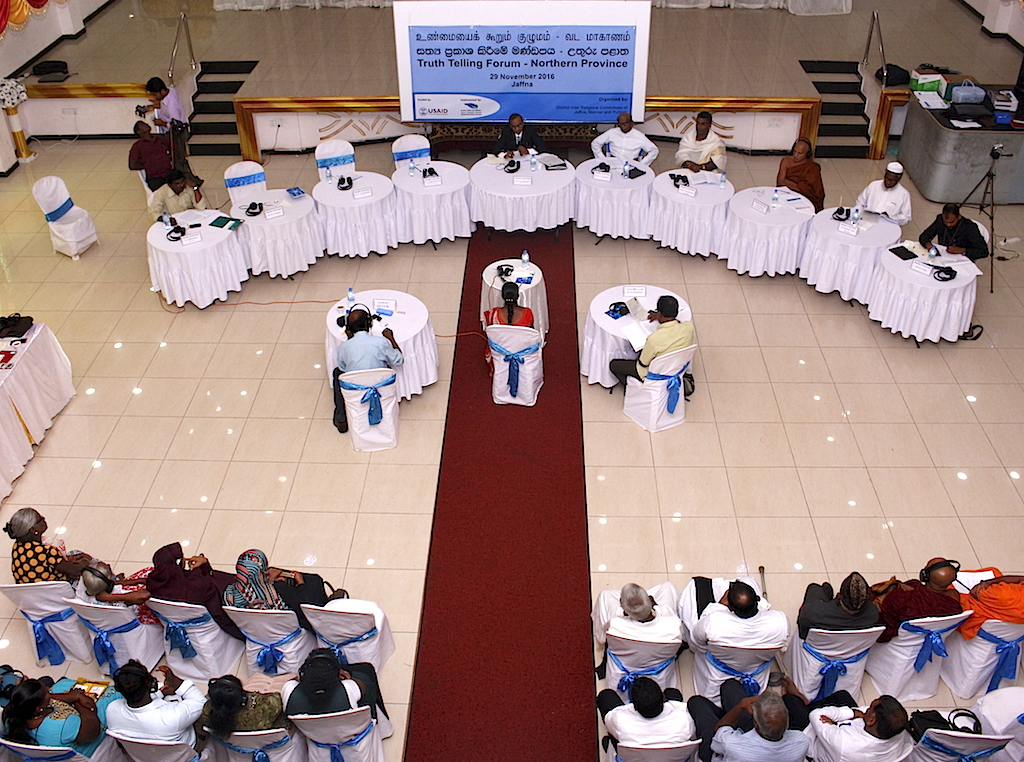
The National Peace Council (NPC) presented the findings of its project, Post Conflict Healing: A Women’s Manifesto, at a national level meeting at SLIDA on December 15. The findings included policy briefing papers, a Women’s Manifesto and a video.
The meeting was attended by Minister of National Co-existence Dialogue and Official Languages Mr. Mano Ganesan, Secretary-General of the Secretariat for Coordinating Reconciliation Mechanisms Mr. Mano Tittawella, Chairperson of the Consultation Task Force on Reconciliation Mechanisms Ms. Manouri Muttetuewgama, NPC Board Member and Founder and Chair of the Association of War Affected Women Ms. Visaka Dharmadasa, and Country Director (Sri Lanka) FOKUS Dr. Shyamala Gomez.
Minister Ganesan stressed the importance of getting involved in the peace building and reconciliation process, pointing out that neither women in the north nor the south had seen justice served or received compensation for trauma they had suffered during the war.
He urged them not to wait for the government to take action but to take their futures into their own hands and start making their own decisions.
“We need to build hearts and minds of people to develop the country. We cannot do it without women. Women must take on the leadership,” he said.
NPC’s project was implemented with the support of FOKUS from April 2014 in nine districts across the country that were both directly and indirectly affected: Vavuniya, Mannar, Trincomalee, Ampara, Galle, Hambantota, Kandy, Nuwara Eliya, and Puttalam. The policy briefing papers and manifesto are outcomes of the objective to bring women’s voices at the grass roots to the forefront of the reconciliation process.
The project mobilised women to take an active part in community healing, to establish lasting peace and to increase the participation of women in the process of post conflict transition.
It also trained participants on Transitional Justice (TJ), women’s rights, role of women in post conflict society, reconciliation, the Lessons Learnt and Reconciliation Commission and its recommendations and UN Security Council Resolution 1325 that deals with women and security.
The briefing papers, which covered the topics of restitution of land and property and economic reintegration, physical security, psychological recovery, democratisation and governance and justice, will be presented to decision makers with the aim that the affected women’s concerns and recommendations will be considered in the future reconciliation process to ensure it is more gender sensitive.
NPC’s Executive Director Dr. Jehan Perera said women were being excluded from decision making. Through the project, NPC had been able to reveal what women thought, their hopes and aspirations. “Women have different priorities than men and we have been able to bring those priorities to the fore,” he said.
Three women from Puttalam, Mannar and Hambantota told the meeting about the trauma they had undergone during the war and the difficulties they were now facing as widows bringing up families and encountering discrimination in many forms. By participating in the project, they had come to realise that all communities suffered during the war, not just their own, and were able to understand and sympathise with the others.
Given the opportunity to ask questions from Minister Ganesan, the women cited the non- implementation of the language policy as a major drawback to reconciliation. Tamil speaking government officials, doctors and lawyers were not available in the north and east, causing many problems in the daily lives of the people.
Another woman asked why the Office of Missing Persons had not been established despite the passing of legislation while others said they were still looking for missing relatives without any success and one asked why political prisoners were not being released.
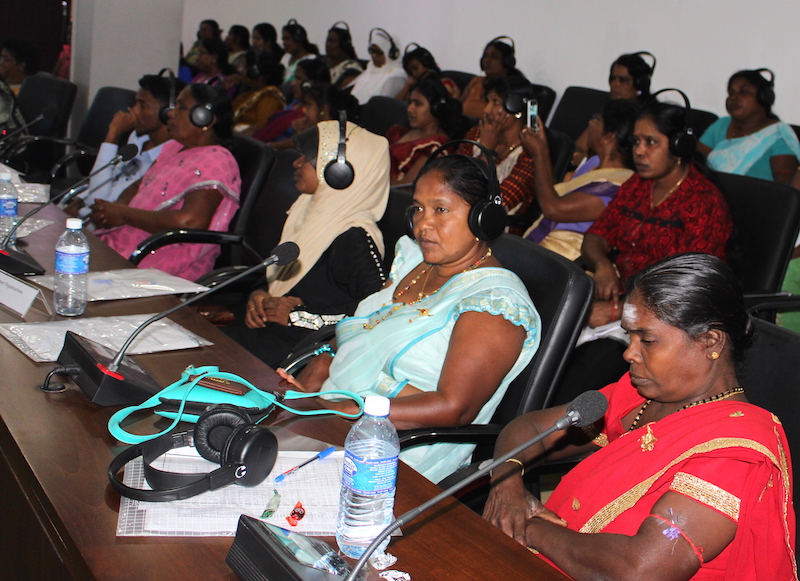
Nuwara Eliya, Ratnapura and Anuradhapura District Inter Religious Committees (DIRCs) organised three events to ease religious tensions that had arisen in their areas.In Nuwara Eliya, DIRC members moved swiftly to defuse a volatile situation in the Hatton area, sparked by rumours of a hotel being built close to the sacred mountain of Sri Pada.
In July this year there was a clash between Tamil and Sinhala students at Jaffna University. The immediate cause of the conflict was whether a Sinhala cultural dance could be added to a welcome ceremony for incoming first year students. The student association decided against it and opted for the traditional Tamil cultural dance only. This led to a violent clash. One of the outcomes was the temporary closure of the university and departure of Sinhala students from Jaffna due to their fear of further incidents.
IMMEDIATE DETERRENT ACTION NEEDED TO ERADICATE INTER-COMMUNITY VIOLENCE
After a two year lull that followed replacement of the former government through the electoral process, public manifestations of inter community tension have increased in recent months. There are indications of political maneuvering behind these efforts to disturb the peace in the country and to bring ethno-religious nationalism to the fore. Video footages of religious clergy engaging in vitriolic attacks on those of other ethnic and religious groups have gone viral on the social media. Ethno nationalist organizations have been engaging in hate campaigns and intimidating those of other communities at the local level. Most notably in the North and East, there are clashes being reported on inter religious grounds. There are many incidents of religious clergy getting involved in expansionist projects, such as religious conversions, destruction of ancient sites or building places of worship in areas where they are less numerous
NPC has launched a new project, funded by the U.S. Agency for International Development (USAID), focused on strengthening community networks mentored by religious leaders and engaging them in building consensus for transitional justice and a pluralistic identity.
NPC, in collaboration with the Centre for Communication Training, provided the peace building component at a sports event organised by the Foundation for Goodness in Jaffna, which included the participation of cricket star Muttiah Muralitharan. The event was supported by Netball Australia.
One hundred students drawn from the Tamil, Sinhalese and Muslim communities attended an NPC workshop on Transitional Justice at the Eastern University in Batticaloa conducted under its project, Initiating Multi-level Partnership for Conflict Transformation (IMPACT).
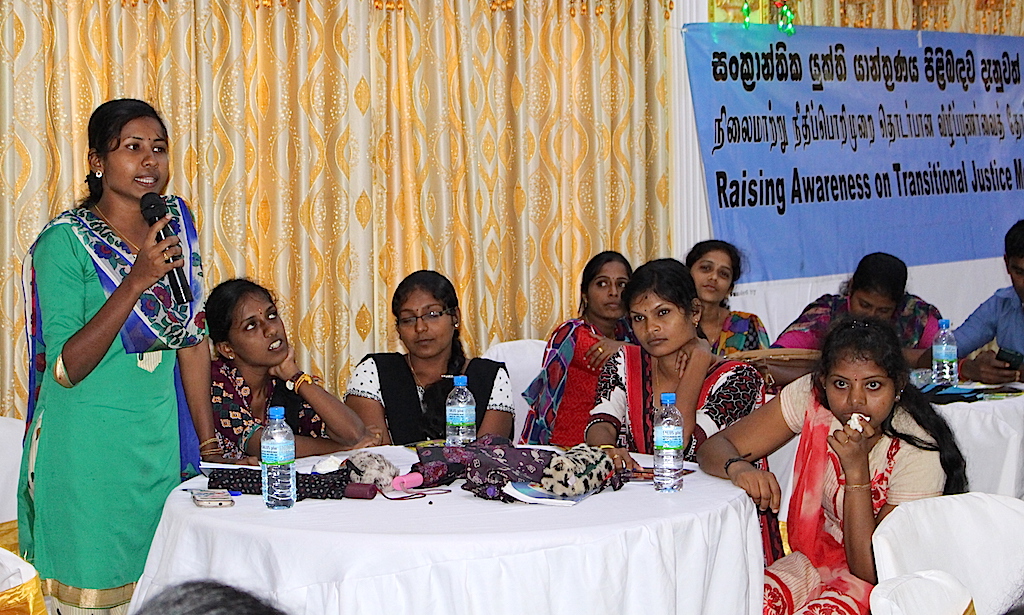
Transitional Justice has four pillars: truth, prosecution, reparations and institutional reform. The students were asked to work in groups to prioritise one of the four pillars. They discussed the question and reported back to the workshop.
Five of the nine student groups chose institutional reform as their first priority as it was the long term solution. They said that if this was achieved, the other three pillars could be accomplished over time. Four of the nine groups chose truth as their priority. They said that without truth it was difficult to find out what the problem was and what the best answer would be. It was necessary for the government to give detailed answers about what had happened during the war, as well as addressing suspicions that Sinhalese colonisation was still happening in the North and East.
The external resource persons were Lal Wijenayake, chairman of the Public Representations Committee on Constitutional Reforms and Raga Alphonsus, a member of the Consultation Task Force on Reconciliation Mechanisms for Mannar District.
The Eluga Thamil (Tamils arise) rally that took place in Jaffna in September gave a picture of resurgent Tamil nationalism. The demands put forward by the organisers included a call for federalism, return of land in the Army’s control, release of political prisoners, an international investigation into war crimes and addressing the issue of missing persons. Some of the academics at the workshop explained that they supported the Eluga Thamil event but not all its slogans.
Although there were critical questions and comments, the discussion was constructive and cooperative. The outcome of the student presentations showed that even the students, who are always more radical than their elders, were practical in their expectations.
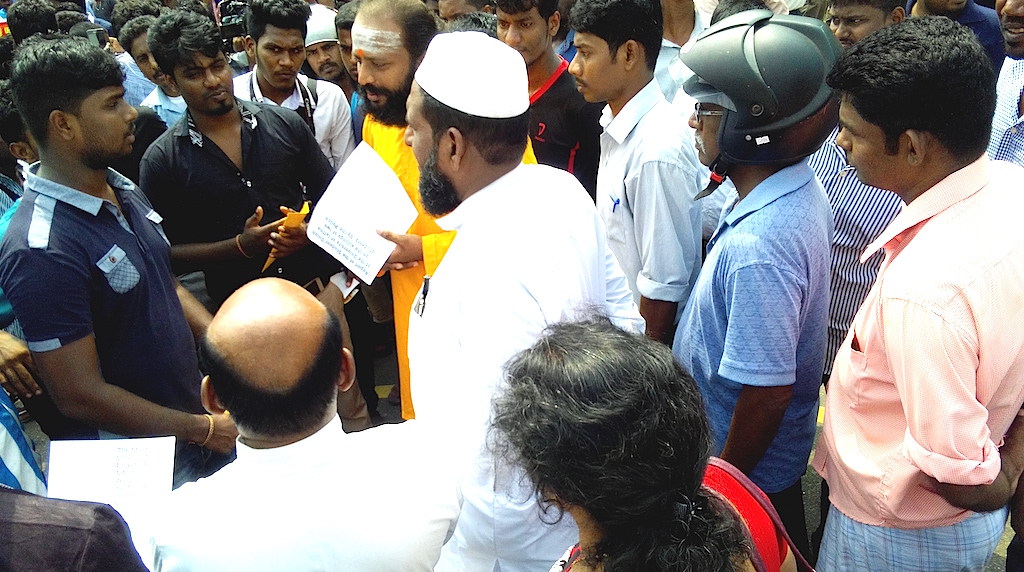 Jaffna District Inter Religious Committee (DIRC) leaders took part in a protest against the killing of two university students by police, which had created a tense situation in the north. Victims' families, students, academic staff and human rights activists participated in the protest outside the Northern Province governor’s office.
Jaffna District Inter Religious Committee (DIRC) leaders took part in a protest against the killing of two university students by police, which had created a tense situation in the north. Victims' families, students, academic staff and human rights activists participated in the protest outside the Northern Province governor’s office.
The DIRC religious leaders later visited the victims' families and expressed their sympathy. They contributed funds to each of the families.
Under NPC’s two projects, Reconciling Inter Religious and Inter Ethnic Differences (RIID) and Initiating Multi-level Partnership for Conflict Transformation (IMPACT), monthly meetings were held in 16 districts across the country.